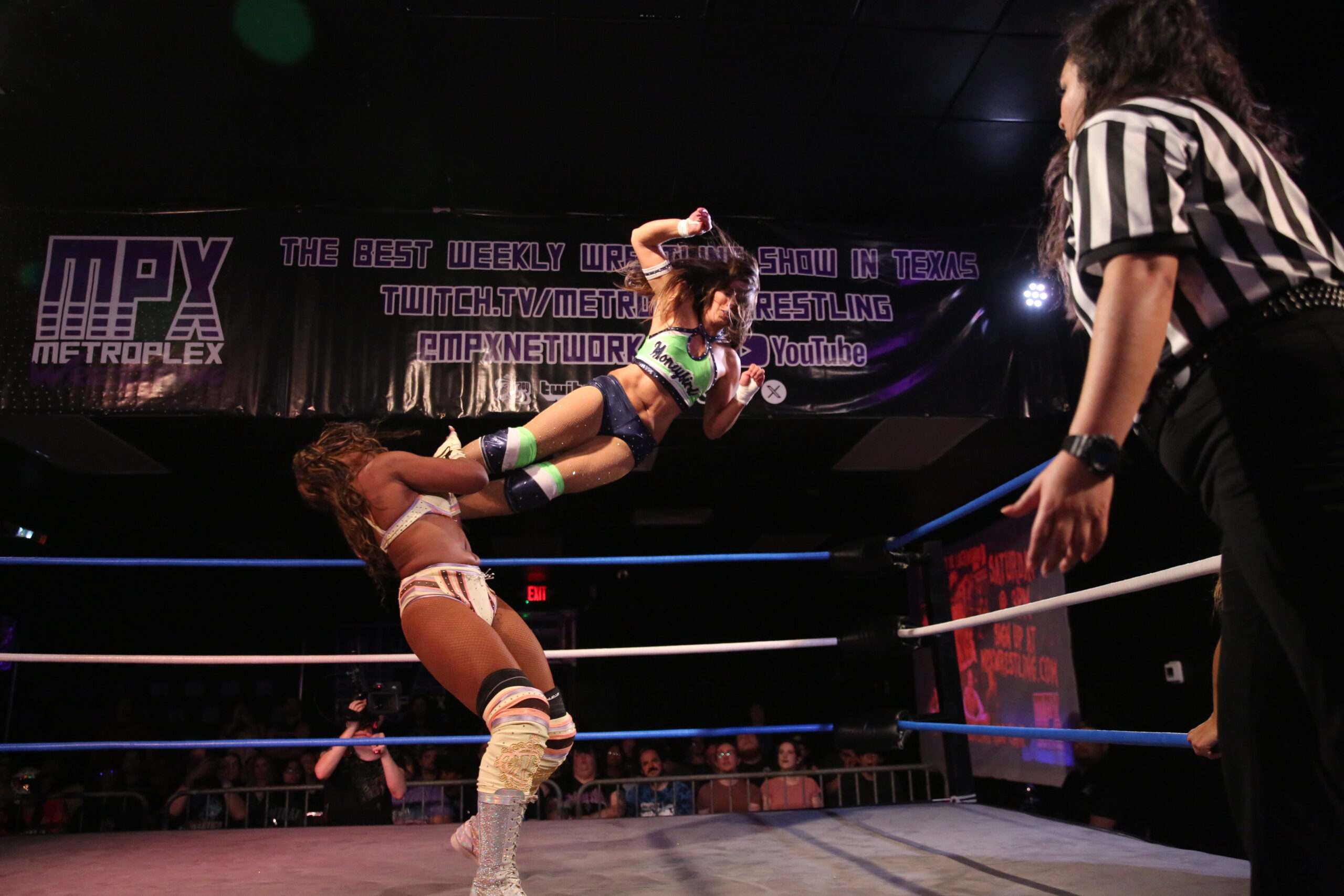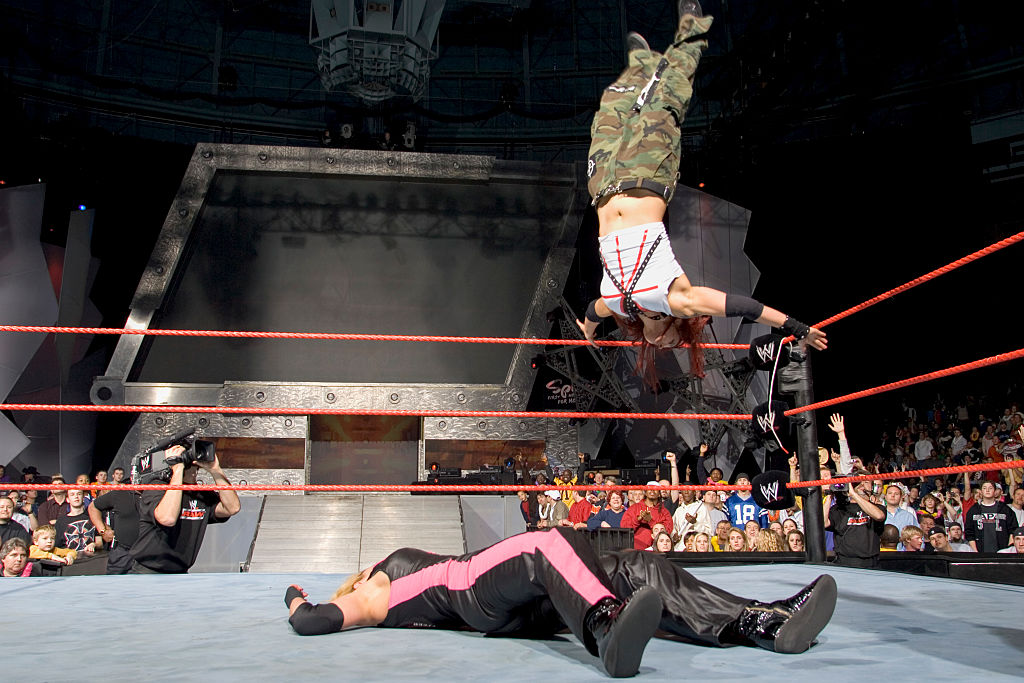The Future of Women’s Wrestling Is Big and Bright in Texas
Welcome to Metroplex
By Scarlett Harris
On the last Sunday in October, in a suburb nestled between Dallas and Fort Worth, Texas, a group of women came together for an all-women’s wrestling show hosted at Metroplex Wrestling, a woman-owned wrestling school. Titled Who Runs the World?, the show was the brainchild of All Elite Wrestling star Athena, and it followed a rousingly successful inaugural show in August; both shows featured some of the biggest names in independent women’s wrestling, including Mercedes Moné, Nyla Rose, and Kris Statlander. A third production is scheduled for January 2026, and will also stream on Twitch.
This sequence of events on the indie scene—three all-women shows in six months!—is a welcome contrast to the mainstream entity World Wrestling Entertainment, which has staged just two all-women wrestling shows in its 70 year history.

Progress for women in WWE has been slow and fitful. Earlier this year, WWE hosted Evolution 2, the much-anticipated sequel to its 2018 show of the same name. In an industry dominated by polarizing macho figureheads like the late Hulk Hogan, both Evolutions were hard-won victories in what we can call wrestling’s second-wave feminist movement, which began in earnest a decade ago and coincided with the growing popularity of women in other sports. And the wrestling on display was an evolution from the slaps, hair pulling, and derisive use of the term “Diva” that characterized women’s appearances in WWE in the decades prior. Trust that there was no sudden awakening, though. For 40 years, WWE was helmed by Vince McMahon, who has been accused of sexual abuse and is currently embroiled in a sex trafficking lawsuit. Despite the fact that current WWE leaders Paul “Triple H” Levesque and Stephanie McMahon have been congratulating themselves for platforming women’s wrestling, most wrestling fans—40 percent of whom are women—credit progress to star women wrestlers themselves, including Becky Lynch, Charlotte Flair, and Mercedes Moné (known as Sasha Banks in WWE, which she left acrimoniously in 2022).
Meanwhile, in the independent wrestling scene, women competitors have been thriving for years—in promotions like Japan’s Stardom, London’s Pro Wrestling EVE (which just crowned its first transgender women’s champion in Nyla Rose), and Chicago-based Shimmer, just to name a few. “Without Shimmer, we might not be where we are today,” says former wrestler and Shimmer manager Allison Danger. “We were able to bring a lot more variety. Having different people from different backgrounds, different races, was making women’s wrestling more diverse.” (Danger is clear to credit past icons, though, “like Mildred Burke, the Jumping Bomb Angels, the Glamour Girls, Madusa, Trish and Lita.”)

The future of women’s wrestling can often be difficult to see because of the long shadow cast by the WWE, a behemoth that seems to only be getting bigger as it aligns with entrenched power. (Levesque has been a frequent visitor to the White House.) The WWE also seems to be getting more shameless: Many fans were turned off by the return of wrestler Brock Lesnar, who is named in the sex trafficking lawsuit against disgraced former WWE chairman Vince McMahon; and WWE has announced that WrestleMania 44 will be held in Saudi Arabia in 2027, even as the kingdom continues to be accused of sportswashing its human rights atrocities.
It remains to be seen whether these all-women’s wrestling shows will have staying power. Shimmer has been on hiatus since 2021, and former WWE wrestler Mickie James has experimented with partnering with different promotions—and even different countries—to find the right fit for her all-women shows. It took WWE seven years to produce a second Evolution, despite having all the money in the world and a wealth of talent (most other WWE premium live events are annual). But do these shows need the backing of large companies like WWE? Sure, it would be great to get an annual Evolution, but women like Athena, James, and Danger remain relentless and collaborative, doing the hard work with a fraction of the resources to bring women’s wrestling to fans hungry for it.
And they’re optimistic about the future. Danger points to the rise in platforms where wrestling can be consumed (a far cry from the tape-trading days when Shimmer was first launched), and says streaming has democratized the sport. Who Runs the World? streams on Twitch.
There’s more opportunity than ever, she contends—and the next generation of wrestlers and promoters will seize it. Says Danger: “We’re in great hands.”

Scarlett Harris is a culture critic, author of A Diva Was a Female Version of a Wrestler: An Abbreviated Herstory of World Wrestling Entertainment, and editor of The Women Of Jenji Kohan.